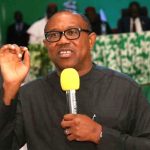Godwin Emefiele, the suspended governor of the Central Bank of Nigeria (CBN), is anxiously awaiting the outcome of the fundamental human rights suit he filed against the Department of State Services (DSS) in an effort to challenge his arrest and subsequent detention.

Today, a ruling is expected to be delivered by Justice Hamza Muazu of the Federal Capital Territory High Court in Abuja, shedding light on Emefiele’s fate.
The events leading up to this legal battle trace back to June 10 when the DSS apprehended the governor shortly after President Bola Tinubu suspended him from office, subsequently ordering a thorough investigation into the operations of the CBN.
Filing the suit through his lawyer, Joseph Daudu (SAN), Emefiele alleges that his human rights have been violated.
The suit names the Attorney General of the Federation, the Director General of the DSS, and the DSS itself as respondents. These entities have filed preliminary objections, challenging the jurisdiction of the court to entertain the case and requesting its dismissal.
During the court proceedings on June 20, I. Awo, counsel for the DSS, informed Justice Hamza Muazu that Emefiele’s detention was lawful, as the DSS had obtained an order from an FCT Chief Magistrates’ Court to keep him in custody until the investigation concluded.
However, Tijjani Ghazali (SAN), representing the Attorney General of the Federation, argued that Emefiele’s arrest and subsequent detention by the DSS constituted an administrative decision within the purview of the executive arm of government. He urged the court not to interfere in the matter.
Disagreeing with these contentions, Emefiele’s lawyer, Joseph Daudu, firmly asserted the merit of the case and its validity in the eyes of the law.
Justice Hamza Muazu adjourned the proceedings until today to rule on the issue of jurisdiction and to consider Emefiele’s prayers. The verdict expected later today will determine whether the case will proceed and shed light on the fate of the detained former governor of the Central Bank of Nigeria.
It remains to be seen how this legal battle will unfold and the potential implications it may have on Nigeria’s financial landscape.





Comments are closed.